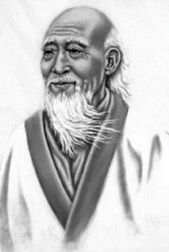Lao-Tzu’s book of timeless wisdom
 When the world is in turmoil what do we do? When terrorists are
demanding a portion of your land, can we remain nonchalant? When your
neighbour is always vilifying you, what do you do? When the world is in turmoil what do we do? When terrorists are
demanding a portion of your land, can we remain nonchalant? When your
neighbour is always vilifying you, what do you do?
These are questions we are trying to find answers to all the time.
Politicians, psychologists and philosophers have given us different
answers. Still we undergo problems that recur from time to time. Is man
placed in such a predicament that there is no permanent solution for his
problems?
According to traditional Chinese philosophy, the whole of nature
consists of the continual interaction of two opposing forces known as
Yin (passive, weak, negative, dark and destructive) and Yang (active,
strong, positive, light and constructive). Most of us are unaware that
Yin and Yang are inextricably linked together. They seem to be operating
in a never-ending cycle of coming together and falling apart. Eminent
philosopher Lao-Tzu says that Yin and Yang show that nothing is
permanent. There will be wars and conflict as long as man inhabits the
world.
Lao-Tzu (c. 575 BCE) was a bureaucrat in ancient China. He was known
as “Old Master”, “Old Boy” and “Old Philosopher.” He is supposed to have
compiled Tao te Ching under a pseudonym as a form of self-preservation.
He did so as he lived during the instability of the “Period of the
Warring states.” Living in a state of “perpetual fear” might have urged
Lao-Tzu to develop a self-preserving “habit of evasive speech.”
Decay of morals
According to legend, he is supposed to have lived for 160 years. He
resigned from his post as he was disgusted with the decay of morals. He
desired to live in a more natural environment. Heading west, Lao-Tzu
reached the Han-ku Pass where he was recognised by the pass keeper. He
requested the sage to compose a book for him as he was leaving his
province. Lao-Tzu then wrote Tao te Ching, a book of 5,000 words.
|

Leo-Tzu: Choose Yin rather than Yong. |
Tao te Ching soon became one of the most influential books in ancient
China. In the number of English translations, it is second only to the
Bible. According to some scholars, the little book is an obscure work
which had a romantic and poetic appeal. What is remarkable is that Tao
te Ching can be interpreted in any way you like. Perhaps its lack of
clarity is one major reason for its popularity. Today scholars believe
that the little book is full of timeless wisdom.
For those who are trained in the western philosophical tradition,
Lao-Tzu presents an ultimate principle or rule which shows the way how
all things operate in the world. His philosophy does not appeal to the
intellect but to our natural instinct. His philosophy has been described
as “too rich, too big and too small.” This is one reason that it defies
definition. The great sage very often contradicts himself but calls our
attention to “the rest of the story.”
Simplicity
Viewed very broadly, Taoism is a way of life denoting simplicity,
spontaneity, tranquillity, weakness and most importantly non-action.
However, non-action does not mean inactivity in its modern sense. It
means “taking no action that is contrary to nature.” Lao-Tzu said nature
should take its own course. If this cannot be understood, the sage must
find a way to “speak without speaking” and “discuss what cannot be
discussed.” Ludwig Wittgenstein (1889-1951), a modern German
philosopher, has expressed the same idea in different words: “What we
cannot speak about we must pass over in silence.”
Although Lao-Tzu says that the way cannot be “reduced” to words, it
does not mean that people should cease to discuss it. To a
scientifically thinking modern man his philosophy may appear to be a
riddle. But he believed in extracting the truth through contradictions
and assertions. In his view, this kind of giving with one hand and
taking it with the other will drive us towards the “way.”
The sage’s main contention was that ideas cannot be expressed exactly
because of the paucity of language. For instance, can anyone explain
exactly why we fall in love with a particular person? Similarly, lofty
ideas cannot be explained adequately in words.
Linguistic precision
Western philosophers are rather reluctant to accept Lao-Tzu as a
philosopher because he does not follow a system in his assertions. While
they demand linguistic precision and the capacity to classify everything
under the sun, Lao-Tzu does neither. He remains an elusive sage who says
that the bad “produces” the good and the good “produces” the bad. The
bad in fact is the other side of the good. So, the good and the bad are
complementary.
The sage patiently waits knowing that today’s unfortunate
circumstances will change into good. Lao-Tzu’s strategy for surviving in
difficult times is to turn away from common values. He advised his
followers to choose Yin rather than Yang.
When there is widespread corruption or violence in society, our
immediate reaction is to meet force with counterforce. The great sage
says that this will lead to stress and frustration. According to him, no
one has control over corruption or violence. Like Lao-Tzu, most of us
are also living amid our own “period of warring factions.” In times such
as these, we should wait patiently for nothing remains the same forever.
|

